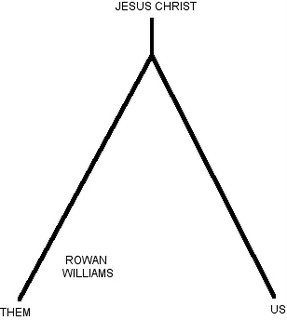An Inconvenient Truth is an important movie about environmental concerns, one which I believe everyone should watch, as either an introduction to or reminder of major issues we all face. Al Gore takes us through the presentation about Global Warning that he makes over and over again across the world, and the documentary part of the movie takes us with him, giving us insights into his own journey to this place where he can speak “inconvenient truth.”
I have been struck by several recent blog entries, videos, news items, events and comments from friends that also speak to inconvenient truths. How do you know something is an inconvenient truth? Mostly by the silence that accompanies the telling.
Inconvenient truth (IT) #1: There are bishop marauders out there and no one is deputized to stop them. No one has caught the pirate Bishop Lyons, except Fr.Jake. The IT here is that Bishop Lyons is clearly in the wrong and no one seems to be able to do anything about it. Fr. Jake has posted an important question – “What do we do with such pirates? Keel hauling comes to mind, but I suppose that is not too Christian of an idea.
Other notables include bishops in
IT #2: It’s the Archbishop’s Party. We don’t yet know who is going to be invited to Lambeth (bishops no doubt). But, after a variety of hints to the contrary, a testy message from Lambeth Palace set us straight: According to the Living Church, “Canon James Rosenthal, communications director of the ACC, said, ‘Canon Kearon did not mention who was coming or not coming to the Lambeth Conference during his time in New York at the bishops’ meeting. The matter of invitations to the Lambeth Conference is solely in the hands of the Archbishop of Canterbury and has nothing to do with Canon Kearon.’” This is helpful, if inconvenient for some.
It has been suggested in the past that the Archbishop cannot decide on his own who may or may not come to Lambeth. Well, that’s over. He does not have to ask the Primates, the Anglican Consultative Council, the Archbishop of York, or anyone. It’s up to him.
IT #3: Consulting with those who are “the problem” is not the Anglican way. The group advising the Archbishop of Canterbury on how to respond to the Episcopal Church, its actions at General Convention and its relation to the Anglican Communion does not include anyone from the Episcopal Church. This continues the IT that it seems inconvenient to consult those referenced. So, never consult gay persons, progressives or other seemingly outrageous persons on matters that concern them. At least there are two lay persons.
I realize and even agree that the Archbishop can consult with whoever he wants. My concern is that he seldom seems to want to consult with people who are “the problem."
George Conger reported in the
IT #4: There will be no more meetings of Network Bishops and the leadership of the Episcopal Church. The meeting in
IT #5: The Church of Nigeria does not believe in, follow, or have any interest in the Windsor Report’s recommendations. This is only an IT for those Anglican Communion instruments of communion, foci of unity, etc, who have to finally deal with the
IT #6: You can’t have it both ways, at least not easily. Susan Russell posted a most remarkable note concerning the election in
Well this IT is one that cuts all ways.
IT #7: The Rt. Rev. Katharine Jefferts Schori is indeed the Presiding Bishop elect, will become the Presiding Bishop, and will, if the Prayer Book rubric is followed have the right of first refusal at any ordination of any bishop in this Church. (See pg. 511), “when a bishop is to be ordained, the Presiding Bishop of the Church, or a bishop appointed by the Presiding Bishop, presides and serves as chief consecrator.
Thinking Anglicans (always on target) had this comment to make regarding the election in
There are many inconvenient truths, even in the Church, but I would be remiss not to add the final one on this list, from the Mad Priest, a wonderfully creative strange fool for Christ.

IT #8: The Anglican Communion simplified: Diagram used with permission. Glad Jesus Christ is the head, wish there were not "them" and "us."

Mark,
ReplyDeleteDid you work to stop Bishop Spong when he denied the Resurrection? If not, why not?
Is that an inconvenient truth?
Actually, anonymous, I wrote a rather lengthly commentary on Bishop Spong's 12 theses, some of it supportive, much of it critical. You can see it if you wish at http://newark.rutgers.edu/~lcrew/harris2spng.html
ReplyDeleteI am not sure it will be to your liking.